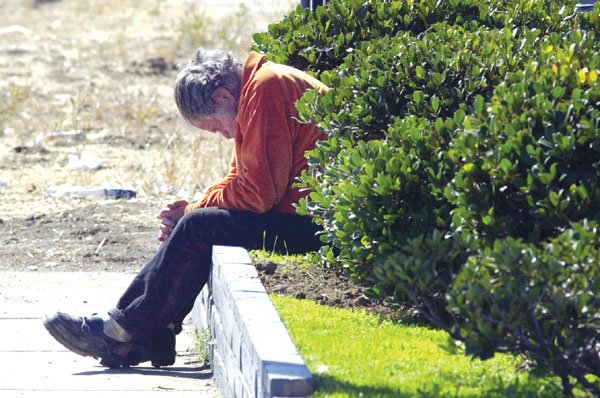GILROY
– This city has no homeless shelter this time of year, but it
has plenty of homeless people sleeping in creek beds, in bushes,
under bridges and behind dumpsters.
GILROY – This city has no homeless shelter this time of year, but it has plenty of homeless people sleeping in creek beds, in bushes, under bridges and behind dumpsters.
The National Guard Armory and the Ochoa Winter Center only open their doors for emergency lodging in cold-weather months. For the rest of the year, these places are otherwise occupied: the armory with soldiers and Ochoa with migrant workers. The Emergency Housing Consortium, which runs the armory shelter, plans to replace it with a year-round facility – but not for three years or more.
So, in warmer weather, those of transient residency sleep outdoors and try to hide from the police. A person can only legally camp in places where they have a property owner’s permission, and such permission is almost never forthcoming from private or public landholders. As a result, these folks sleep covertly, in out-of-the-way niches.
Gilroy police haven’t always gone to the trouble of clearing them out, but that changed recently. This past weekend, specially assigned officers charged seven people with illegal camping, a misdemeanor offense. These enforcements are part of a campaign the Gilroy Police Department revived within the last two weeks. Similar efforts two years ago had some success in reducing the presence – or at least the visibility – of homeless campers in Gilroy, according to GPD Sgt. Kurt Ashley, who headed the campaign then and is doing so again.
It’s not just complaints from property owners and other housed citizens that sparked this, according to Ashley. More importantly, he said, the GPD has the environmental impacts caused by campers in mind.
“They’re urinating, defecating, dumping their trash,” Ashley said.
When the creeks fill up with water in winter, this waste will wash downstream. The result can’t be good for plant and animal life.
“It’s got to be a little more of a problem than just being unsightly,” Ashley said.
Uvas Creek encampments
Down in the thick growth along Uvas Creek, near Santa Teresa Boulevard, has been a popular place to camp. The dense bamboo and brush provides excellent hiding places, as well as soft bedding and cover from the rain. Under the Santa Teresa bridge, the traffic noise isn’t nearly as loud as one might expect.
Gilroy police officers Paco Rodriguez and Brandon Richards were appointed by Ashley to enforce illegal camping laws. On Monday, they ordered several transients to leave the creek. Richards said they’ve sent eight to 10 people out of there in recent days.
“There’s a lot more,” Rodriguez said. “They’re tucked in pretty good, so it’s hard finding them.”
The officers haven’t been recommending anyplace for the people to go, they said; they’ve just been telling them to get out. Asked where people could legally sleep in Gilroy without money, Richards said he didn’t know.
“That’s a hard question,” he said. “What I’ve been telling them is, ‘Look, we’ve been getting a lot of complaints.’ ”
As a result, Richards said, they just camp somewhere else, and he often finds himself chasing the same people all over town.
“I don’t know if there are fewer (homeless people as a result of the police campaign),” Richards said, “(but) they’re moving from the areas we’ve told them.”
“Hopefully we can get them out of here,” Rodriguez said of Uvas Creek. “It’s pretty dangerous. There’s wild animals, poison oak and ivy.”
A patchwork of dozens of private and public entities own Gilroy’s creek beds, according to city community development staff.
Police: Homelessness is a lifestyle choice
What forces lead people to this type of subsistence, which relies not only on resourcefulness and wits but on a steady diet of charity: bag lunches, hot meals, clothing vouchers and emergency shelters when available? Alcoholism is often involved, as are drug addiction and mental disorders. Some say there’s also a large amount of free will.
“Most of these people are alcoholics and narcotics abusers who choose not to get help,” Ashley said. “They don’t want to work. They choose this lifestyle.”
Officers Richards and Rodriguez echoed this.
“The ones that we’ve spoken to actually prefer this lifestyle,” Richards said. “We’re willing to help them, but they’ve got to be willing to help themselves.”
“A lot of them have families around here,” Rodriguez said. He and Richards often tell them to stay with family but can’t force them to do so, he said.
Homeless man: ‘It’s no life at all’
Doug LeFiell was sitting on a low wall at the corner of Monterey and Tenth streets Tuesday – head hung, hands folded, eyes closed, flies hopping around on his grimy hands and clothes.
LeFiell is 63 years old and a confessed alcoholic. In his hand was a Squirt soda bottle which he said contained booze. He has a lively sense of humor, but he’s also plagued by what he sees as the immoral implications of his drinking and lifestyle.
“I’m going to Hades,” he said gloomily when first approached. “That’s Hell.”
LeFiell said he’s been sleeping in bushes and was roused by the police a few nights ago.
“They told me, ‘Doug, your time’s up,’ ” he said. While he said he doesn’t like them, he recognizes that they’re doing their job. He admitted that homeless people rarely clean up their garbage.
He didn’t choose this life, he said, adding, “It’s no life at all.” The only explanation he could give is that his parents drank, too.
LeFiell didn’t say how long he’s been in Gilroy, responding only that “I like it here; it’s warm at night.” He gets “free eats” from St. Joseph’s Family Center. He might go to a shelter if one was open here, he said, but “not with a bottle in my pocket.” Shelters generally prohibit on-property alcohol possession.
He’s worked intermittently in the past, at car washes and bars, and he’s also been on social assistance – but not now. Until recently, he said, he’s been getting drinking money from his girlfriend, who doesn’t touch alcohol herself.
Better off in jail?
In Ashley’s experience, those charged with illegal camping can never afford the fines.
“What generally happens is that several of (the tickets) build up, they get a warrant and they end up in jail,” he said. “But at least during that time in jail, they’re sober.”
There really isn’t a solution to the homeless problem, Ashley said.
“You can’t force someone into AA (Alcoholics Anonymous),” Ashley added. “What we’re hoping to do is get them to make the decision.”
Over the years, Ashley said, “I’ve only gotten one (homeless addict) to go for treatment, and that one stayed sober for a couple years. Now, he’s back on the streets.”
“There’s a couple of them, they’re probably better off in jail,” Rodriguez said. “They get three square meals.”
With one guy Rodriguez knows, “When he got out (of jail), he was about 20 pounds heavier than when he went in. He’s got a family and kids, but he just says, ‘They don’t need me.’ ”
Home sweet bridge
Under the railroad bridge, in the dry bed of the West Branch of Llagas Creek, by Monterey Street just north of First, a tidy little settlement could be found at midday Tuesday. A battered couch gave it an air of semi-permanance. Neatly arranged toys were juxtaposed with a picture of a naked woman on the wall. There was a fire pit with a grill rack. There was a garbage can, nearly full, and the ground was clear of litter. A trash bag was full to bursting point with bottles, mostly 40-oz. malt liquor, with dozens more bottles in piles nearby. A toothbrush was perched on a bridge support post, next to a plastic red rose and a side-view mirror from an old truck.
Under the Monterey Street bridge, about 20 yards away, there was a set of buckets that had recently been used for washing clothes, judging from a pair of jeans soaking in one and a bottle of detergent nearby. Two men’s razors and a shampoo bottle were there as well.
As Dispatch staff were leaving the scene, a woman drove up in a sport-utility vehicle and asked if a particular person was down in the creek bed. When told no one else was there, she said, “I guess he moved,” smiled and drove away.















